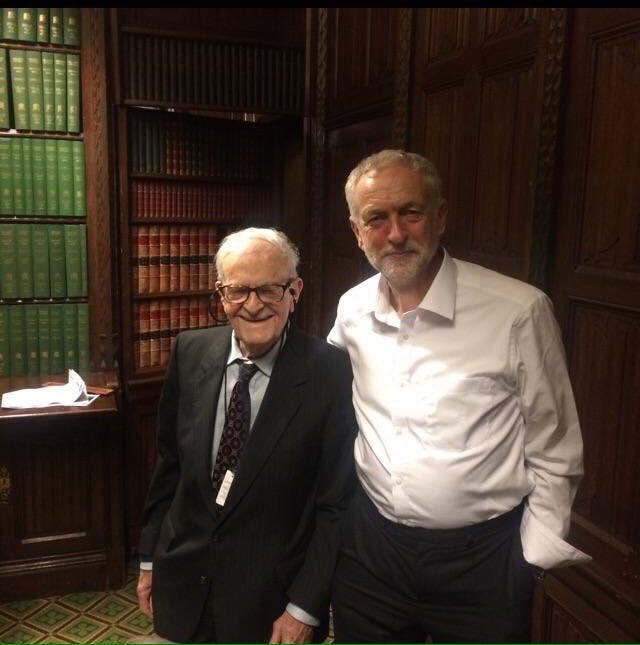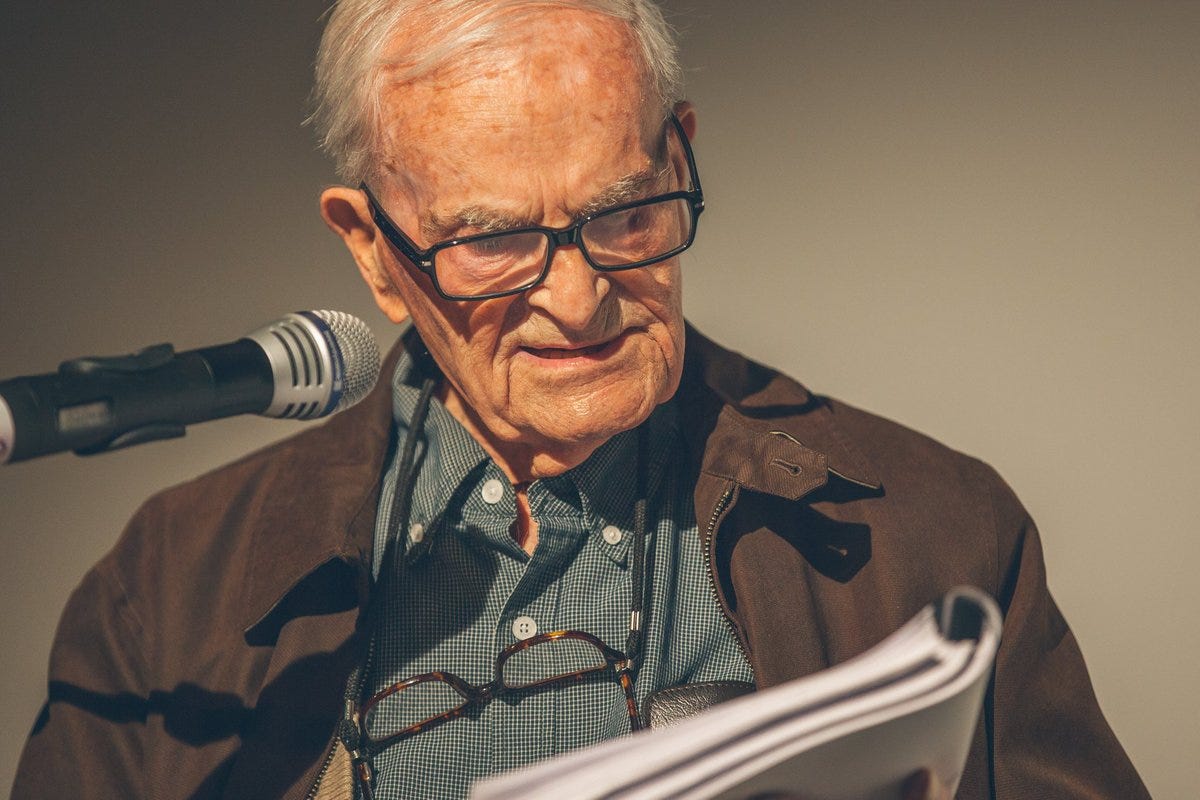Keir Starmer's Labour Party Betrayed Britain's Greatest Generation's Fight For Economic Equality.
History isn't repeating, it's trolling us. In 2025, with over 4 million children living in poverty, it's not possible to believe we can stop my father's past from becoming our future because too many, today are living it. Keeping my father's legacy alive can't stop what has already happened to our society. However, the answers my father's generation used to end poverty and homelessness can be applied to our times.
Before my father died in 2018, he spent the previous decade using the history of his life and working-class contemporaries as a political canvas to paint the dangers of unfettered capitalism for humanity and democracy. He correctly predicted that without a return to socialist politics- fascism and wealth inequality would destroy not just our society but civilisation itself.
His unfinished history- The Green & Pleasant Land is a part of that project, along with the five other books written during those last years of his life.
For the last year, I have been refining and editing The Green And Pleasant Land to meet my dad’s wishes.
His unfinished history- The Green & Pleasant Land is a part of that project, along with the 5 other books written during those last years of his life.
For the last year, I have been refining and editing The Green And Pleasant Land to meet my dad’s wishes. Below are more chapter excerpts from it. The final chapters are soon to be made available and it wasn’t planned. But it seems his 1945 will unfold here on SubStack through March, April and May, 80 years after they occurred.
I have also included a tip jar for those, who are able to assist me in this project.
I am offering a 20% reduction on a yearly subscription to this SubStack because I am still scrambling to make the rent with three days to go.
Beta copies of The Green and Pleasant Land are almost ready, and for anyone who wants one. Send me a DM, and I will put you on the list.
Below is from my father's introduction to child labour. But hopefully, by Sunday I should have the D-day section up.
The Green & Pleasant Land Bradford 1930.
One morning, when the money from the poor relief had run out early, and there was no food for breakfast. My mum told me I needed to work like a man now, or the family would starve, be homeless and end up in the Poor House. During our talk, she wept & cursed Ramsey Macdonald, whom she called a lying Labour bastard.
Mum grabbed my hand and said the off-licence down the road was looking for help. She said I should go immediately and alone. I was to speak clearly and tell the owner I would work longer and harder than anyone else in the neighbourhood.
I did as I was told. I went to the off licence and approached the owner behind the counter. I told him I was looking for work. He laughed and gave me a disdainful glare. I told him that my dad was once a miner, but injury had robbed him of employment.
I was hired because of cold-hearted capitalism as it was cheaper to employ children in the 1930s rather than adults. The owner liked how I could work for next to nothing because my family was famished. He promoted me in no time to beer barrow boy.
I was tasked to deliver crates of beer to local customers. I weighed no more than seventy pounds, and I stood less than five feet. But I pushed a steel-wheeled handcart, wide enough to fit five crates of beer containing nine, one half-pint bottles. It was arduous work for a seven-year-old, and I was threatened with lost wages for broken or stolen bottles.
My tiny legs and arms hurt after pushing the barrow during my daily shift. I manoeuvred my wares up and down the narrow industrial streets of our neighbourhood. It was a great humiliation for my father to watch me return from work and place my wages into the family’s piggy bank.
My tips, however, I hid from my parents. With those pennies, I bought treats for my sister and myself. At bedtime, my sister and I rushed upstairs to our cold attic room, where under coats for blankets, we shared a Cadbury’s chocolate bar, cut into enough pieces to last us the week.
There was now little time for lessons and homework because my work at the off-license took precedence. I was angered by this because even a seven-year-old knows when they have been enslaved by economic circumstances. I also felt dumb because the more I worked, the more I fell behind in schoolwork.
I started skipping school because I was ashamed to not have done my homework and hated the teasing from those who didn't need to work to help pay the rent.
I spent most of my days loitering or daydreaming in the city centre of Bradford. I walked myself to distraction. Sometimes, I met my father on the High Street in a similar state of truancy. If he had a penny, he'd give it to me sheepishly.
“Be on your way lad. Make sure your Mum is none the wiser of our encounter.”
On Saturdays, after work, if I had enough tip money, I'd take my sister Alberta to the Thruppeny Rush at the local movie theatre. (three short movies for 3 pennies)
We watched the comedies of Laurel and Hardy, Charlie Chaplain, Buster Keaton, and Harold Lloyd. For a few pence, my sister and I disappeared into a celluloid dream for an hour. At the Odeon, everything was funny and ended with a smile or a kiss. In the pictures, everything was different to our way of life and those who occupied our doss house.
The cinema was a place of refuge for a small boy like me. Movies and serials let me fantasize and drift away into a world filled with adventure and rewards. On the giant screen, sadness was overcome with laughter, the villain vanquished and justice was always delivered.
But none of that existed in my world. Where I lived there was hunger, anger, and unfathomable melancholy. Adults knew they had been betrayed by a society that only benefitted the rich. But once they became residents of a doss house like the one my family lived in they had no fight left. They resigned themselves to a miserable death on the dole.
At the movies, I escaped that world. But the moment I got back into the door of my doss house house reality slapped me awake to the misery of my existence.
Once after a thrupenny rush, I went into the common room and saw my father staring forlornly at a wall. At the other corner of the room, Mum sat breastfeeding my brother Matt and held court with the other lodgers. Irritated by my entrance or my calls for attention, my mother pulled out her engorged breast from Matt’s wet lips and pumped her milk across my face. It ran down my cheeks as if I was sobbing cream.
Mum laughed and with deranged cruelty said sarcastically.
“He looked hungry too!”
I dashed from the room and hurried up to my attic refuge. Upstairs, alone and angry, I cried because I knew how far my life was from the movie fantasies I watched at the cinema.
**********************
The first seven years of my life were just one episode of calamity and despair. It was a tumble of events, not of my making. I was a child who if I wanted to survive had to grow up quickly to defend myself in a world gone feral from economic collapse.
I was weaned on death, grief, homelessness, hunger, familial discord and parents shamed by their inability to survive in the inhospitable financial climate of the 1930s.
It was too much to absorb emotionally. Yet all that I experienced and witnessed during those formative years of development grew in me, wrapped around my heart as if it were a tumour of dysfunction.
It’s a bit of an SOS with days left before rent day. About 7 new subscribers will put it over the line.
Your support keeps me housed and allows me to preserve the legacy of Harry Leslie Smith. Your subscriptions are crucial to my personal survival because like so many others who struggle to keep afloat, my survival is a precarious daily undertaking. The fight to keep going was made worse- thanks to getting cancer along with lung disease and other comorbidities which makes life more difficult to combat in these cost-of-living crisis times. I promise the content is good, relevant and thoughtful. But if you can’t it is all good too because we are in the same boat. Take Care, John





Neoliberal Labour is as beholden to its corporate paymasters as the Tories and Reform.